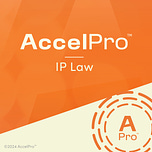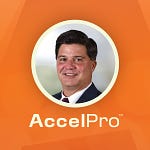Listen on Apple Podcasts, Spotify and YouTube
Welcome to AccelPro IP Law, where we provide expert interviews and coaching to accelerate your professional development. Today we’re featuring Part I of a conversation with Professor Ann Bartow.
Bartow is a professor whose work focuses on the intersection between intellectual property law and public policy concerns, privacy and technology law and feminist legal theory.
In this interview, Bartow discusses copyright infringement, Campbell vs. Acuff-Rose, Weird Al Yankovic and questions of parody versus satire. Bartow is especially interested in the long-term consequences of Campbell v. Acuff-Rose and how 2 Live Crew’s version of “Oh, Pretty Woman” became an important pivot point for musicians making creative works.
NOTE: Listen to Part II of the AccelPro conversation with Ann Bartow.
Listen on Apple Podcasts, Spotify and YouTube.
Interview References:
Ann Bartow’s American Law Institute profile.
7:24 | Campbell v Acuff-Rose Music, Inc, 9510 U.S. 569 (1994).
10:27 | Campbell v. Acuff-Rose Music, Inc. (6 November, 1993). CSPAN.
TRANSCRIPT
I. COPYRIGHT INFRINGEMENT
Neal Ungerleider, Host: Can you tell us a little bit about yourself and your areas of specialty?
Ann Bartow: My area of specialty is primarily intellectual property law, and then one thing that makes me unique is I sometimes take a feminist legal theory twist to intellectual property law. I also study contiguous areas like privacy law.
Privacy law doesn't have a natural overlap with intellectual property law on the surface, but, in fact, what happens in intellectual property law is that the law actually propertizes things.
And it turns out that's a lot of what's going on in privacy law. People are trying to turn privacy into property, or figure out a legal approach that gives them rights in their own information, or rights in their own right to be alone. And comparing it to property, such as intellectual property, is one of the roots that some privacy law scholars have taken.
NU: We'll come back to that later. From your perspective: What is the standard for assessing infringement of works with limited creativity and thin copyrights against virtually identical copying?
AB: When we talk about copyright infringement, there are really multiple kinds of copyright infringement that you want to start out with when you analyze any dispute.
The most obvious copyright infringement is literal copying. You have an eight hundred page book, someone copies it with a photocopier, or a scanner, or camera, and now they have an identical copy of your eight hundred page book. That's literal copying.
A very different thing happens when someone takes your book and does something different with it. They take your characters, maybe your basic plot and your setting, and twist it around a little. Then we would say that if it is substantially similar to the original work, there might be a copyright infringement.
A third category is something we call derivative works. If you infringe this way, you'll be making unauthorized derivative works. The difference between a derivative work issue and a substantial similarity issue can sometimes be hard to pinpoint. I generally like to think of it as: If you take a book and make another book, that's usually a substantial similarity issue, although it could be a derivative work issue.
But if you take a book and make an unauthorized movie–that is very different–because when you make a book into a movie, you have to change, add, subtract, and do things differently. That's potentially copyright infringement by being an unauthorized derivative work.
And then even within those broad categories, there can be some subcategories. Sometimes, something will come up where parts of a work are taken literally, but other parts are left out. Sometimes that's called fragmented literal similarity, and we ask whether a work takes too much from something else.
So the standard for when you've infringed a copyright can be really hard to predict. You're probably thinking, when you talk about literal copying, that's easy. If someone takes the whole thing, that's easy. But in fact, there are times when the copyright law, under fair use doctrine or other doctrines, will allow the making of 100% identical copies under some circumstances.
Let me explain for a second why that's important. We live in a society where we just don't know what's coming down the pike. We know that there are situations in the Ukraine, Russia, and the Middle East.
As soon as you have people in dire situations because of a war, protecting art and cultural antiquities is generally not a priority for most people. You have basic things: safety, food, shelter, maybe having to leave an area. People aren't thinking about art or cultural property.
So one of the things that copyright law over time has evolved to try to do is to come up with doctrines. For example, the doctrine of moral rights–where people try to convince other people and the citizenry that destruction of art or destruction of antiquities, whether it's a consequence of war or any other reason, is a really bad idea.
Sometimes that works, sometimes that doesn't. But at the end of the day, your best defense–whether you have an armed conflict or something like a flood or a fire–is to have backup copies. We do not want the only copy of one book to be in the library in New Orleans that got flooded during the hurricane. We don't want it to be in the Yale Library when there's a fire or a flood. We want multiple copies.
So to the extent that cultural works contain things that we want to preserve, we want backup copies for libraries and for anybody.
There was a time when if you bought a computer, and if you had software for your computer, you could make a backup copy. The software would let you, and it was really handy when things got lost. You had a spare.
It was really handy, and people did perfectly legitimate, non-discriminating, non-infringing things with backup copies. And the move toward the inability to purchase software, where now all you can do is license it, has given consumers a lot fewer options. And it's been justified as a way to protect copyrights.
—
II. FAIR USE AND 2 LIVE CREW
NU: And what are the main differences between fair use and fair dealing in copyright law and jurisdictions outside the U.S.? And here in the United States, for our members here, are there any equivalents domestically?
AB: Fair dealing is more associated with Canada, generally. That's the term they use. And they do take a slightly different approach.
In the United States, we've seen a lot of fairly dramatic shifts surrounding fair use since around 1996. The Supreme Court in the late 1990s made a turn toward endorsing the freedom of relatively newcomer artists who are second comers to creating works that are transformative.
The particular case where this came up was actually a music case in which Roy Orbison performed a song with 2 Live Crew. It's a Supreme Court case, from 1996 called Campbell v. Acuff-Rose.
Acuff-Rose was a music publisher. Campbell was a performer in the rap/hip hop group 2 Live Crew. What happened was Roy Orbison, fairly famously, performed a song called “Oh, Pretty Woman.” He was a co-author and Acuff-Rose, the publisher, held the publishing rights.
I'm not a huge Roy Orbison fan, although I can make a pretty good Roy Orbison impression. He's very distinctive, and he's very popular. He does, “Oh, Pretty Woman” in a very distinctive way when he sings “Mercy.”
2 Live Crew, a really creative act, decided that they would like to do their own rap version of the song, and so they asked Acuff-Rose for permission. They were willing to pay and license the song, and my understanding is that Acuff-Rose said no.
They didn't just say no, but they said no with a certain cultural flavor, that wasn't taken too well by 2 Live Crew. And 2 Live Crew said, “You know what? We're going to make this song anyway. We're going to take the best parts of ‘Oh, Pretty Woman.’ We'll take a little bit of the melody, we'll take the title, but we're going to make it our song. Not just a hip-hop version of ‘Oh, Pretty Woman,’ but different lyrics, different meanings, different everything.” And so they went ahead and they did it. Then they got sued, not surprisingly.
Because 2 Live Crew was associated with hip hop, at that moment in history, a lot of the criticism was couched as “Whoa, you're infringing copyright.” It was really straight up racism. Really poorly disguised, too.
There's this great clip of C-SPAN from when they did this interview right around the time this was going to the Supreme Court of the guys from 2 Live Crew. They said, “They're acting like we've done something disgusting or contaminated their song. All we did was make our own version. All we want to do is sing. We're musicians, too. How do we become a public enemy? Why is this a crime? Why are we going to the Supreme Court to justify our right to sing?”
I love to have my students get that history, because there's no way I can recapture them talking about their song and what it's like for rappers to make this choice and defend that choice to the Supreme Court, for goodness sake.
When the opinion was written, it was written by Justice Souter, who's actually my neighbor here in New Hampshire.
He wrote an opinion that really embraced the adoption of transformative use. The idea behind transformative use is that when 2 Live Crew came out with their version of “Oh Pretty Woman,” it’s rap with different lyrics, and just a completely different song, and the two songs do not compete. You will never convince me that somebody wants Roy Orbison, gets 2 Live Crew by accident, and says, “Oh, no one will notice the difference.”
They're completely different songs! If you want 2 Live Crew–and that would be my preference, I would rather listen to that song–then you're not going to think that Roy Orbison substitutes at all.
There are some people in favor of strong copyright because they think original creators need to have strong protections, and I understand that view. But I like a world where we have weaker copyright protections if it doesn't hurt anybody.
Roy Orbison didn't lose–I don't think, at least, a single sale–to 2 Live Crew. If that's the case, I don't understand why we don't want as many songs as possible. If 2 Live Crew wants to do a version, if someone wants to do a chanting version–that's the goal of copyright to me. I see copyright as incentivizing new works. I see that as the prime directive and the most important job of copyright. So I loved the macro takeaway from this case of transformative use.
But… Here's where it got a little weird. They decided that they needed to categorize the work as either a parody or a satire. If it is a satire, it has a weaker claim for fair use. But if it was a parody, it had a stronger claim for fair use. The idea behind it, you have to read through the opinion, was questionable; it's not really easy to adapt.
—
III. PARODY AND WEIRD AL YANKOVIC
I think the strangest thing about it is that when you think about parody music–I don't know if it comes to your mind, but I have a son– when he was a kid, he idolized Weird Al Yankovic. When that album came out, Poodle Hat City, my son and my friends absolutely adored it.
He’s an only child and I decided to indulge him a little and I got tickets to a Weird Al Yankovic concert. I was not at all optimistic about my concert experience.
But I was complaining to a friend of mine who teaches at Toledo, another law professor named Lou Gibbons, and I said, “Oh, I'm taking Casey to see Weird Al. Pray for me, or should I wear earplugs.’ He's like, “Weird Al is cool. You're going to love it!” I was dubious about it, but he was totally right.
Weird Al's a freaking genius, okay? His song parodies are not my favorite work, but he's actually written a lot of straight up songs that you don't know he's the author of and which other people perform. And at his concert he performed some of them. So I was wowed by his skill as a composer. The other thing I couldn't get over is that most of the audience was not teenage boys, as I expected, but adults just like me.
They knew every word to Poodle Hat City also. And it was a nice, friendly audience. The kind of audience that has to get home by 8 and let the dog out. My kind of audience.
But I had one of the best times ever. And during the intermission, Weird Al had a video in which he talked about copyright law. So then my son's friends were elbowing me; “Don't you know copyright law? Maybe you can help Weird Al.” I was like, “I would love to help Weird Al.”
Because here's Weird Al's problem. After Campbell vs. Acuff-Rose, Weird Al, under the law as the Supreme Court explained it, should be able to parody any song he wants and get a record deal and have it nationally broadcast. If he wants to do Michael Jackson's “Beat It”–he famously did the parody “Eat It.” He had to license that; he had to get Michael Jackson's people, or whoever held the copyright, to give him permission to do “Eat It.”
And, he didn't say this, but my guess is that he may have had to make concessions. There may have been something in the draft he may have had to change. Again, I don't know who was calling the shots. But he just said in the copyright video, “I want to be able to parody anybody I want! And Copyright Law stands in my way.” And he's smart; he knew what he was talking about. And he wanted to explain it to an audience of non-copyright lawyers.
The truth is that the law under Acuff-Rose gave him absolute freedom, within limits, to do a parody of any song he wanted. But the music companies just told him, “We are not releasing this album. We are not distributing this album unless you get permission, because we don't want to get sued and have an expensive case. Even though we know you're going to win. We still don't want to deal with the time and the mess.”
Frankly, lawyers are lovely people, we pay them a lot of money, and copyright law just has a huge impact on an artist like Weird Al. He's an obvious case because we associate him with song parody.
Getting back to 2 Live Crew, the Supreme Court decided that their version of “Oh, Pretty Woman” was a parody. And to me, that doesn't compute. Under the analysis they set up, it had to be a parody and it couldn't be satire. Colloquially, I would have characterized it as satire, because that's just the way I thought of satire.
The way the Court explained it was: If you make a song and the song is making fun of the song, that's parody and that's okay. But if you take someone else's song and you make fun of a third thing, like some social commentary, that's satire. That's a little less likely to be fair use and less likely to be okay.
When I listen to 2 Live Crew's version or read the lyrics, to me, they're making social commentary that's broader. But it works just as well to say they were making fun of Roy Orbison, because that's what got them the win, right? If they're literally just making fun of the song and Roy Orbison and white men who purport to put women on a pedestal, but secretly are sexist and gross–if that was the point of the song, they won. And it's actually funny because Orbison comes out looking less well if it's a parody versus a satire.
At the end of the day, what the case really does at a macro level is show you the conflict between copyright law and free speech. If you want to make fun of Roy Orbison, you ought to be able to do it in text. In a podcast like I'm doing now, no offense, again, I know many people are big fans. But, if you want to make fun of Roy Orbison–whether it's textual, or whether you just write a song kind of mocking his song–at least under Acuff-Rose, that's okay.
NOTE: Listen to Part II of the AccelPro conversation with Ann Bartow.
Listen on Apple Podcasts, Spotify and YouTube.
This AccelPro audio transcript has been edited and organized for clarity. This interview was recorded on November 30, 2023.
AccelPro’s expert interviews and coaching accelerate your professional development. Our mission is to improve your day-to-day job performance and make your career goals achievable.
Please send your comments and career questions to questions@joinaccelpro.com. You can also call us at 614-642-2235.
If your colleagues in any sector of the IP law field might be interested, please let them know about AccelPro. As our community grows, it grows more useful for its members.












